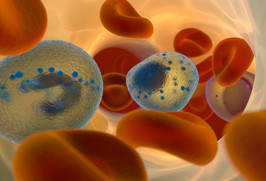Positive real-world data has been presented for Celltrion’s infliximab biosimilar CT P13 at the European Congress of Rheumatology 2019 (EULAR 2019).
The positive real-world data for CT P13 was presented in the form of two abstracts [1, 2]. According to the authors, the data ‘show that treatment with CT P13 is well tolerated’.
In one study, 329 patients with rheumatoid arthritis (RA, n = 134), ankylosing spondylitis (AS, n = 110) and psoriaritic arthritis (PsA, n = 85) were recruited at 38 academic and community sites in six European countries and Canada [1].
The results showed that most treatment-emergent adverse events (TEAEs) were of mild or moderate intensity, with 7/129 events being severe. The most commonly reported adverse events were related to infection (n = 33; 10.2%) and the most frequently reported infection-related TEAEs were nasopharyngitis (n = 6; 1.9%), respiratory tract infection (n = 5; 1.5%) and pneumonia (n = 4; 1.2%). No cases of tuberculosis was reported. Eight (2.5%) patients reported infusion related reactions.
Based on these results the authors concluded that ‘incidences of TEAEs were similar and there was no discernible pattern across the most common TEAEs between groups’. They added that ‘these interim analysis results from the PERSIST study conducted in a real-world setting are consistent with the known safety profile of infliximab and do not demonstrate new safety information to change the benefit−risk profile of CT P13’.
In a second study, safety data from 1,579 patients treated with at least one dose of CT P13 in the 4 observational studies (KOREA PMS, CT-P13 4.2, CT-P13 4.4, and PERSIST) were collected. This included 670 RA patients, 819 AS patients and 90 PsA/psoriasis patients.
TEAEs were reported in 50.15%, 37.73% and 26.67% of RA, AS and PsA/PSO patiemts, respectively. The incidence of TEAEs in the RA indication is consistent with the historical rate in this population. Treatment emergent serious adverse events (TESAEs) were reported for 12.39%, 4.52% and 3.33% of RA, AS and PsA/PSO patients, respectively. The incidence of TEAEs leading to discontinuation were 8.81%, 3.42% and 7.78% for RA, AS and PsA/PSO patients, respectively. Two deaths and one death were reported among RA and AS patients, respectively. The causes of death in RA patients were acute respiratory distress syndrome (ARDS) and bronchopneumonia; the cause of death in the AS patient was unknown. Adverse Events of Special Interest (AESIs) for CT P13 were analysed in the safety population who were treated with CT P13 at least once by the data cut-off point. No events of serum sickness, haematologic malignancy, demyelinating disorder or sarcoidosis/sarcoidosis-like reaction were reported.
Based on these results the authors concluded that ‘treatment with CT P13 is well tolerated in patients with RA, AS, PsA and PSO in the real world setting’.
These results were presented at the European Congress of Rheumatology 2019, which took place on 12‒15 June 2019 in Madrid, Spain.
Conflict of interest
The authors of the abstracts [1, 2] reported conflicts of interest, including being employees of pharmaceutical companies. For full details of the authors’ conflict of interest, see the abstracts [1, 2].
Editor’s comment
It should be noted that data of the studies presented in this article were published as abstracts and presented at a conference. These data and conclusions should be considered as preliminary until published in a peer-reviewed journal.
Related articles
Long-term follow-up of switching to biosimilar infliximab
Is switching to biosimilar infliximab safe?
References
1. Taylor PC, Christensen R, Moosavi S, et al. FRI0122 (2019): Real-world safety data from patients with rheumatic diseases treated with CT-P13, an infliximab biosimilar: an interim analysis from an observational study. European Congress of Rheumatology 2019; 2019 Jun 12−15; Madrid, Spain.
2. Baek K, Lee YJ, Lee S, et al. FRI0104 (2019): A large real world, long term safety study of patients with inflammatory rheumatic diseases treated with infliximab biosimilar (CT-P13): pooled analysis of four global post-marketing studies. European Congress of Rheumatology 2019; 2019 Jun 12−15; Madrid, Spain.
Permission granted to reproduce for personal and non-commercial use only. All other reproduction, copy or reprinting of all or part of any ‘Content’ found on this website is strictly prohibited without the prior consent of the publisher. Contact the publisher to obtain permission before redistributing.
Copyright – Unless otherwise stated all contents of this website are © 2019 Pro Pharma Communications International. All Rights Reserved.








 0
0











Post your comment